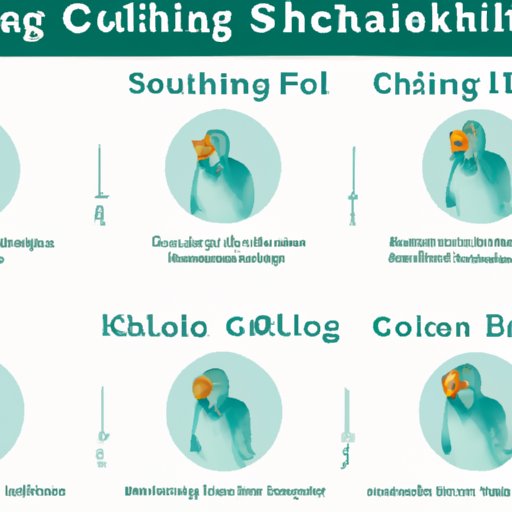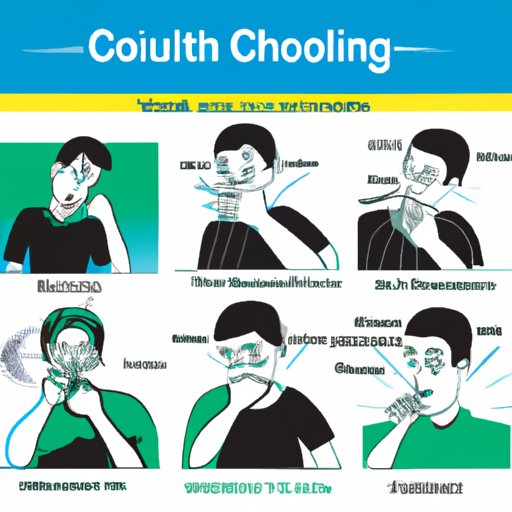Introduction
Coughing is one of the most common reflexes in the human body. It’s a natural response to irritants and foreign particles that enter our airways, and it helps keep our lungs clear. But what exactly happens when we cough? This article will explore the anatomy, causes, treatments, and science behind coughing, as well as how to differentiate between a cough and a cold or allergies.
Anatomy of a Cough: Exploring the Mechanics Behind This Common Reflex
Coughing begins with a deep breath, which draws air into our lungs. The air enters through our nose and mouth and passes through the trachea (windpipe) before reaching the lungs. Muscles located in the chest and abdomen work together to help push the air out of the lungs, resulting in a spasmodic expulsion of air, known as a cough.
The muscles of the chest and abdomen are not the only players involved in the cough reflex. There are also several other anatomical structures, including the diaphragm, vocal cords, and epiglottis. The diaphragm is a thin sheet of muscle that separates the chest from the abdomen. When we inhale, it contracts and flattens out, allowing air to enter the lungs. When we exhale, the diaphragm relaxes and the air is pushed out of the lungs.
The vocal cords are two small bands of tissue located at the top of the trachea. They vibrate when air passes through them, producing the sound associated with coughing. The epiglottis is a flap of tissue located at the opening of the trachea. When we swallow, it closes off the trachea to prevent food and drink from entering the lungs.

Understanding the Causes and Treatments for Chronic Coughing
Coughing can be caused by a variety of things, but the most common cause is an infection. Viruses such as the common cold and influenza are responsible for many cases of coughing. Bacterial infections, such as bronchitis, can also cause coughing. Other causes of coughing include allergies, asthma, smoking, and certain medications.
Treatment for chronic coughing depends on the underlying cause. If the cause is an infection, antibiotics may be prescribed. For allergies, antihistamines or corticosteroids may be recommended. Inhaled medications such as bronchodilators may be used for asthma-related coughing. Smoking cessation is also recommended for those who suffer from chronic coughing due to smoking.

Coughing 101: An Overview of the Human Cough Reflex
Not all coughing is the same. There are actually different types of coughs that serve different purposes. The most common type of cough is the dry cough, which is often caused by allergies or a viral infection. A productive cough, on the other hand, is one that produces mucus or phlegm. This type of cough is usually caused by a bacterial infection and helps to clear the airways.
It’s important to be able to recognize when you are coughing. Coughing is usually accompanied by a feeling of tightness in the chest and throat. You may also experience difficulty breathing, wheezing, or a tickle in the back of your throat. Coughing can be a sign of an underlying condition, so if you experience any of these symptoms, it’s important to see your doctor for a diagnosis.
How to Stop Coughing: A Guide to Self-Care Solutions
If you’re dealing with a persistent cough, there are some self-care solutions you can try to help reduce coughing. First, avoid triggers such as smoke, dust, and pollen. If you have allergies, make sure to take your medication as prescribed. Drinking plenty of fluids can also help thin out mucus, making it easier to expel. Finally, using a humidifier or taking a hot shower can help loosen congestion.
Over-the-counter medications such as decongestants and expectorants can also help with coughing. Decongestants help reduce swelling in the nasal passages, while expectorants help to thin out mucus and make it easier to expel. However, it’s important to talk to your doctor before taking any over-the-counter medications, as some may interact with other medications you’re taking.

The Science Behind Coughs: A Closer Look at What Makes Us Hack
When we cough, several chemical reactions take place. Coughing is triggered by irritants such as dust or smoke. When these irritants enter our airways, they stimulate nerve endings in the lining of the lungs, which in turn send signals to the brain that tell us to cough. The brain then sends signals to the muscles of the chest and abdomen, which contract and relax to help push the air out of the lungs.
When the air is expelled, it carries with it mucus and foreign particles. Mucus is actually created by the mucous membranes that line the airways. It contains enzymes, antibodies, and other compounds that help protect the lungs from infection. As the air passes through the airways, it carries these particles away from the lungs.
Coughs, Colds, and Allergies: Differentiating Between These Respiratory Symptoms
It can sometimes be difficult to tell the difference between a cough and a cold or allergies. Colds are usually accompanied by other symptoms such as fever, sore throat, and congestion. Allergic coughs, on the other hand, are usually dry and persistent and may be accompanied by sneezing and a runny nose. If you’re not sure what’s causing your cough, it’s important to see your doctor for a proper diagnosis.
Conclusion
Coughing is a reflex that helps the body rid itself of foreign particles and irritants. Understanding the anatomy, causes, treatments, and science behind coughing can help you better manage this common reflex. If you’re experiencing chronic coughing, it’s important to seek medical advice to determine the underlying cause. With the right treatment, you can find relief from your coughing symptoms.
(Note: Is this article not meeting your expectations? Do you have knowledge or insights to share? Unlock new opportunities and expand your reach by joining our authors team. Click Registration to join us and share your expertise with our readers.)
